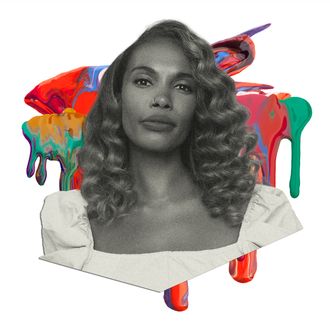
The Lip Bar founder and CEO Melissa Butler has always done things her way — and it works. The vegan brand is known for its bold matte lipsticks and easy-to-use, on-the-go makeup, but it wasn’t an overnight success. Ten years ago, Butler memorably went on NBC’s Shark Tank to pitch the colorful lipsticks she was making in her Brooklyn kitchen while she worked on Wall Street. Ambitious and confident in the bubblegum pink and nontraditional green shades that she formulated for all skin tones, the Sharks turned down — and some of them even mocked — Butler and her co-founder. Fast-forward to today, and the Lip Bar not only sells lipstick but also makeup for a full face.
The brand is now the largest Black-owned makeup company stocked in Target. In January, when the retailer announced it was rolling back DEI initiatives in the wake of the Trump administration’s attacks, Butler spoke out. “Even though I’m disappointed, I’m not that surprised,” she said in a video that amassed over 4 million views on TikTok. “Trump is emboldening companies to reverse commitments that they never wanted to do in the first place, and that’s not just true for Target — I think it’s true for a lot of companies.” She added that boycotting the retailer over the policy change would only hurt Black- and women-owned businesses like hers.
Butler has always been this raw and real with her customers, and that grit has gotten her business to reach heights that many minority-owned businesses don’t see. She even launched a second brand, Thread Beauty, an expressive makeup line targeting Gen Z, in 2021. Butler lives in her hometown of Detroit, Michigan, where the Lip Bar’s brick-and-mortar store is located, but she spends much of her time traveling for work (and play). Here’s how she gets it done.
On her morning routine:
I travel a lot for work, and I’m on the road every seven to ten days. If I’m traveling, I probably have something to do and I’m up at ’em immediately. But if I’m at home, I’m either good Melissa, who gets up, does a little prayer, works out, showers, then makes a matcha or a chai latte. Or I’m Bad Melissa, who’s on her phone immediately reading emails, checking Shopify to see how much we made yesterday, maybe following up on something that I didn’t do, staying in bed until 8:30 a.m., then getting up and continuing to work.
On managing stress:
When you travel a ton, it’s hard on the body. You end up fucking up your routine, whether that’s being in a good flow of exercise or meditation or eating. I try not to make it look easy because it’s not. The world keeps spinning. My team still needs me and is asking me for things even when I’m traveling. I still have my personal needs. The only way to survive in these moments is knowing that you won’t get it all done. During COVID, I realized I needed to give myself grace, and that’s a big part of managing the stress. Radical acceptance is what I call it. We have a launch coming up, and yesterday an entire shipment of lip-plumper products were lost. I’m like, They’re lost? Well that sucks. Next. Because what else can I do?
On not getting it done:
If I feel like something goes wrong where I didn’t do what I said I was going to do, I’m immediately in action mode. You can’t be results-oriented if you are focused on punishing yourself. Whether it’s missing a workout, missing an entire shipment, or not hitting sales goals, there’s a dissection that happens. Okay, well why didn’t you get it done? And you have to be really honest with yourself. Melissa, if you don’t work out, that means that you are not putting yourself first. By not putting myself first, is it because of a lack of discipline, or is it because of extenuating circumstances? If there are extenuating circumstances, then what can I do to structure my day, my life, and my work so that I can get it done?
On the most challenging part of being a CEO …
You know how some people say you’re not responsible for people’s emotions? That’s not true. I don’t believe in that. You are absolutely responsible for the things that you say, the things that you do, and the way you make people feel. As a CEO, you have to have that level of awareness, to know the way you give someone feedback will impact their emotions. I am a straight and a sharp shooter, so I had to learn how to communicate with empathy and understanding, while also being direct about the fact that this is a business and there are needs that have to be met.
… And the most rewarding part:
Knowing that something that you drummed up in your head was effective, or emotionally touched someone, or made someone feel better or pretty or more confident. When women are like, “Girl, I put on that Bawse Lady and I feel like that bitch,” there’s nothing that makes me happier.
On learning to celebrate her wins:
As a business owner, you are taught to go after what’s next. There’s this mentality that we are supposed to keep growing. I had to learn how to stop and smell the roses, otherwise you feel like you’re on a hamster wheel. The statistics are, like, 50 percent of all businesses fail within the first five years, and it’s less than 20 percent of all businesses that make it to $10 million in revenue and ten years in business. Thankfully, we’ve done both. When I think about everything that had to happen in order for us to beat these odds year over year, I get in my warm feelings. Sometimes you need other people to remind you.
On the importance of traveling for herself:
Last year I was in Egypt, Kenya, and Morocco. I travel so I don’t lose myself. I have to remember that there is Melissa Butler, the founder and CEO of the Lip Bar, but also there is Melissa Butler, the human who has interests that have nothing to do with the Lip Bar. The human side has the opportunity to feed and fuel the boss-babe CEO. I have to create space for me to be me, otherwise, I’ll resent work. Your life should not be work. That is what I have learned in my travels: There are people with a lot less who are happier and who are less stressed.
On the best advice she’s ever gotten:
One of my investors and one of my good friends said, don’t play junior varsity when you’re already varsity. You have the ability to continue to dream big and do big things, and it requires you to be uncomfortable. You can easily be comfortable doing the things that you’ve always done, because you know how to do them. But you won’t grow in that way. That’s not how LeBron became LeBron.
On building community:
We talk to our customers all the time. Sometimes we call people and ask them, “How did you find us? What did you think about that product? Would you shop with us again?” We’re trying to understand what people’s experience is so that we can constantly improve. That’s been our secret sauce. They know that No. 1 we care, and that No. 2 we don’t just stick to makeup. If there’s something impacting our community, we’re going to be involved. This last election cycle, we were very involved. When it comes to these Target boycotts, for instance, we are going to speak out. The makeup is great, but also, these are humans with lives, and we respect their experiences and we know they don’t have to shop with us. They do it because we show them that we care.
On the legacy she wants to leave in the beauty industry:
I want the beauty industry to look at the Lip Bar as the brand that centers beauty as something that isn’t to be had; it’s something that you are. It’s something that’s internal, not something that you have to acquire. I don’t want people to think that you have to work for beauty. I hope that translates through our use of models, through our use of creating products that work on a wide range of people. The goal is for people to know that they’re enough, with or without makeup.


